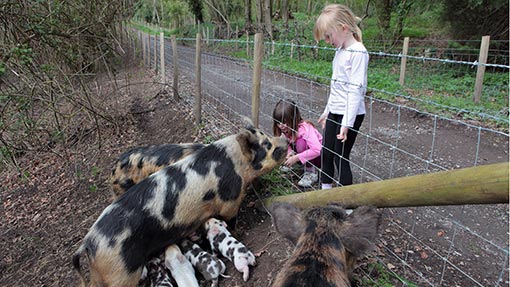How Open Farm Sunday can boost your farm business

Getting involved in an Open Farm Sunday event can be very rewarding and helps showcase the breadth of British farming and food, according to two Cambridgeshire arable farmers.
Precision farming, sugar beet harvesting and the cereals supply chain are three things about farming David White is keen to tell the general public about on Open Farm Sunday on 8 June. But he will not be doing this from his own farm base at Hawk Mill Farm, Little Wilbraham, Cambridgeshire.
See also: Open Farm Sunday sign-ups off to a flyer
Instead, he is bringing some equipment along and helping out at nearby Russell Smith Farms at Duxford. This is one of the few larger Open Farm Sunday events attracting more than 1,500 visitors. It relies on a team of volunteers, many of them local farmers, to host stalls and demonstrate farming activities to visitors.
What is Open Farm Sunday?
- Taking place on 8 June 2014, more than 350 farms across the UK are set to open their gates to around 200,000 visitors in a celebration of farming and food.
- Organised by LEAF (Linking Environment And Farming), it’s sponsored by Asda, The Co-operative, M&S, Tesco, Waitrose, AHDB, BASF, Country Life, DEFRA, Farmers Weekly, Frontier, John Deere, Kellogg’s, LEAF Marque, NFU, Syngenta and Hellmann’s.
“We take pride in what we do and it’s important we demonstrate the high standards of British arable farming to the general public,” said Mr White. “We bring along our six-row sugar beet harvester. That always proves a popular draw.”
This year he is planning to bring along a tractor to demonstrate auto-steer GPS technology. “One of the farm staff, Paul Smith, brings his Suffolk Punch horse to show people, so it’s a nice way to illustrate how farming technology has moved on.”
They also man a display of the cereal products that pass through the local grain co-operative. “We have tubs of different crops and packets of breakfast cereal and encourage visitors to make the connection. This helps tell people about the care and integrity that goes into British cereal production,” Mr White said.
The props help tell the story, but it is the farmers people have come to see, he added. “You have to be quite outgoing and initiate a conversation, but you’d be surprised how interested people are and what interesting people you meet.
“In farming, you don’t get many opportunities to interact with consumers, so it’s worth finding out a farm nearby that’s opening for Open Farm Sunday and offering to help – it’s very rewarding.”
Former Farmers Weekly Awards Arable Farmer of the Year John Goodchild has also helped at the Duxford event. Previously manager of the nearby Bartlow Estate, he brought their six-row sugar beet harvester and cleaner loaders to demonstrate the beet harvest.
“What might seem matter of fact to us is really quite interesting to members of the public. The Duxford Open Farm Sunday is now a known local event and it’s well attended. It’s also well organised and gets plenty of support from farming organisations as well as farmers, so it acts as a great showcase for the local farming industry,” said Mr Goodchild.
Top tips to tell your arable story
- Find your local event: Go to www.farmsunday.org to find a farm near you that’s opening and offer to lend a hand or provide some content for the event.
- Use props to tell your story: Large arable kit can grab attention, but use everyday tools, samples of produce and inputs such as fertiliser to illustrate how you farm, and make it memorable by keeping it personal to you.
- Make the connection: Start with what people see on the supermarket shelf – use bread, beer and cooking oil, for example, and relate them back to farm produce and growing crops.
- Numbers show the size of it: In one second, a combine harvester gathers enough wheat to make about 1,000 biscuits; the average wheat field produces 250,000 loaves of bread or enough oil from oilseed rape to power a family car round the world four and a half times!
- Drop the jargon: An acre is just over half a football pitch, an agronomist is a crop doctor, while drill, tramlines and headland have different meanings outside farming.
- Enjoy your day: Be positive and outgoing – if you take pride in what you do, it can be immensely rewarding to tell your story, and people are truly interested in how their food is made.
